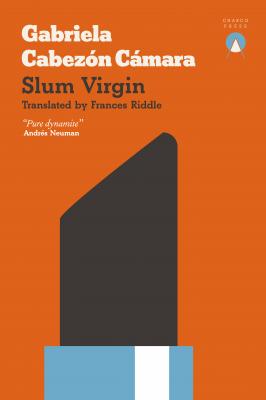Slum Virgin. Gabriela Cabezón Cámara
Читать онлайн.| Название | Slum Virgin |
|---|---|
| Автор произведения | Gabriela Cabezón Cámara |
| Жанр | Юмористическая фантастика |
| Серия | |
| Издательство | Юмористическая фантастика |
| Год выпуска | 0 |
| isbn | 9781999722715 |
Gabriela Cabezón Cámara
Slum Virgin
Translated by Frances Riddle
Contents
1. Quity: ‘Everything that’s born has to die’
2. Quity: ‘We were given a new life’
3. Cleo: ‘It was all thanks to the Virgin Mary’
4. Quity: ‘The virgin spoke like some medieval Spanish girl’
5. Quity: ‘It all started with the cops’
7. Quity: ‘I’d been working for hours and hours’
8. Quity: ‘I went into the slum’
10. Cleo: ‘The water started to flow’
11. Quity: ‘On this land so fertile’
13. Quity: ‘What we had in the slum is lost’
14. Quity: ‘Long live the Slum Virgin’
15. Cleo: ‘You’re forgetting everything, my love’
16. Quity: ‘Flowers, flowers!’
17. Quity: ‘We were there just long enough’
18. Quity: ‘She was an evil, vile rat’
19. Quity: ‘They took him out with a gunshot’
21. Quity: ‘Bulldozers and breakers’
23. Quity: ‘It was from inside the sorrow’
24. Quity: ‘I don’t regret our love’
25. Quity: ‘He who has a heaven’
For Ana, my love
For Karina, Lola, Lautaro and Amparo
1. Quity: ‘Everything that’s born has to die’
Atoms, molecules whipped into a frenzy by random chance, that’s all life is. This was the kind of profound insight that filled my head out there on the island in the Delta, half-naked and without any of my things, not even a computer, just a little bit of cash and the credit cards I couldn’t use until we left Argentina. My thoughts were rotten: sticks, beer bottles, lily pads, used condoms, crumbling docks and headless dolls, a collage of losses discarded by the tide. I felt like a castaway who’d barely survived a shipwreck. Although I’ve learnt by now that no one ever really survives a shipwreck. The ones who drown end up dead and the ones who are saved spend the rest of their lives drowning.
We stayed in the town of Tigre on the Paraná Delta the whole winter, engulfed by the fog from the river that flowed endlessly past. We didn’t speak much. For me, everything was underscored by pain, suffused with it. I floated through daily life, alien to everything that sustained me: the smells of the kitchen and the heat of the wood-burning stove. Cleopatra exercised all her talents under the shadow of the Virgin, ignoring my dazed indifference to life and death, to the whims of deranged molecules that lay waste to worlds and children in the course of their adventures. I lived folded in on myself in the foetal position, just like the creature growing inside of me and in spite of me: my womb was alive with a daughter who continued to grow even though I was a cemetery of dead loved ones. I felt like a stone: an aberration, a state of matter, a rock imbued with the knowledge that it was going to be crushed and reconfigured and transformed into something else. And this knowledge hurt. I haven’t done any scientific research on the topic, but surely you never get two rocks that are exactly alike. Or maybe you do – who the hell could ever compare all the rocks of all time? And I don’t know that it would lessen the pain for this rock to know that maybe, once, there had been another identical rock somewhere in the expanses of time, one that doesn’t even exist any more. All that exists are the movements of molecules, the fundamental restlessness of the elements. I don’t give a fuck whether there’s ever been or never been another aberration identical to me or to Kevin. Nature doesn’t conform to the rules of mass production: ‘It’s not an assembly line, the products aren’t all the same, because there’s God,’ said Cleopatra. ‘There is no God,’ I told her sometimes, the few times I ever spoke, when she came in with the analgesic of her exuberant and optimistic imagination. Little stories about Kevin in a paradise of PlayStations with huge screens – ‘Just picture it, Quity, the screen is the world, my love’ – and the Virgin Mary as mum and God as grandpa. Because Cleo had the familial complexities of the Holy Trinity all worked out; according to her, God would be the Virgin’s father. ‘So he’s Jesus’s father too, Cleo?’ I asked. ‘Wouldn’t that be like incest?’ ‘Oh, darling, you mean incest like that cockroach Carlos who fucked his daughter and left her pregnant and we gave him the beating of a lifetime but the child was already properly screwed up and properly pregnant anyway?’ ‘Yes, Cleo, incest, or like you say: he’s a cockroach.’ ‘Look, Quity, how could God be anything like that piece of shit Paraguayan, stop fucking around. Jesus is the son of Mary alone.’ Firm in her theological certainties and her genealogical connections, she continued with her part of the dialogue that we repeated almost every day on the island: ‘I’m coming from a place of love, Quity, I want you to know where Kevin is. He’s in heaven, you idiot. He’s happy.’ ‘Sure, Cleo, and he’s eating ambrosia cookies, right?’
Death pained me. His and mine and my daughter’s, even though she wasn’t alive yet in the strict sense of the word, that is to say she still hadn’t been born. Everything hurt. When your consciousness opens up to death or death opens up to your consciousness an abyss rips through the centre of your being, leaving cracks of lacerating emptiness, emptiness
